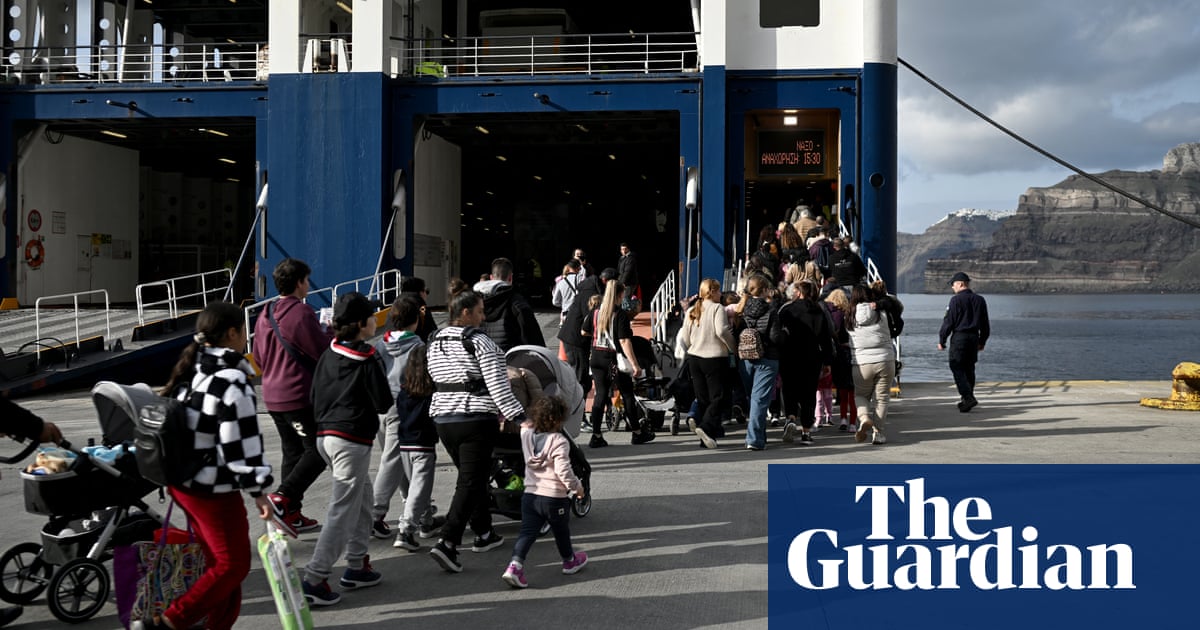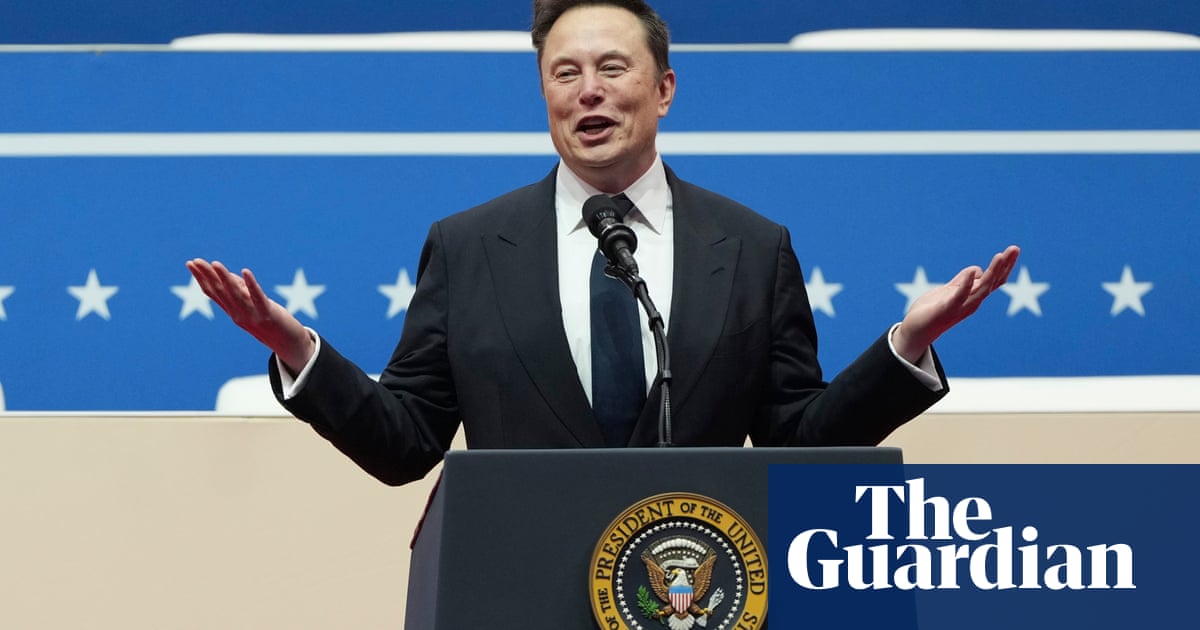Middle East correspondent

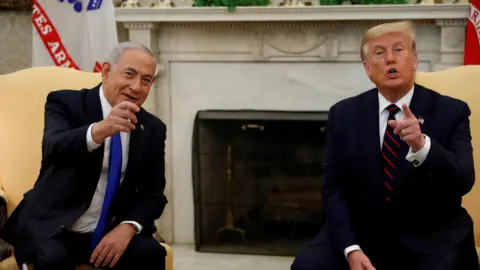 Reuters
ReutersIsrael’s Prime Minister, Benjamin Netanyahu, is set to become the first foreign leader to meet President Donald Trump at the White House in his second term on Tuesday at a critical juncture for the Gaza ceasefire.
After his arrival in Washington, the Israeli ambassador to the US, Yechiel Leiter, who took up his post one week ago, described this as “an historic visit” on X. “The US-Israel friendship is strong and is getting stronger,” he added.
Trump has claimed credit for sealing the initial six-week ceasefire deal halting 15 months of war between Israel and Hamas. So far, this has led to 13 Israeli and five Thai hostages being freed and 583 Palestinian prisoners released in exchange.
However, Netanyahu – facing a struggle for his political survival – has repeatedly stated that the existing Gaza deal is for a temporary ceasefire and that Israel has reserved “the right to return to fighting” against Hamas, saying this would have US backing.
Already one of the veteran Israeli PM’s far-right allies has quit his coalition over what he described as a “reckless” deal. Another has threatened to leave if the military offensive does not resume. If he left, the government would lose its majority.

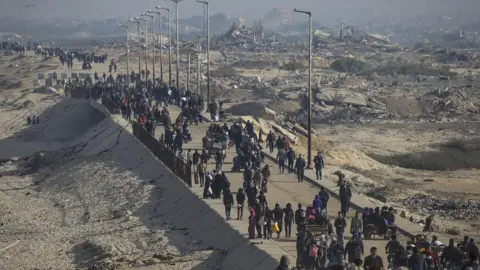 EPA
EPAOn Monday, Netanyahu is due to have talks with the US Middle East envoy, Steve Witkoff, who emerged as a key mediator – working with Qatar and Egypt – to secure the truce which began on 19 January.
If all continues to go to plan, a total of 33 hostages held by Hamas and another armed group, Palestinian Islamic Jihad, are meant to be released by 1 March, in exchange for some 1,900 Palestinians held in Israeli jails.
Already the agreement has led to a major surge in desperately needed humanitarian aid to the Palestinian territory and the partial withdrawal of Israeli forces.
The sensitive next stage of the ceasefire is supposed to see a more permanent end to the war and the release of the remaining hostages seized in the deadly Hamas assault on 7 October 2023. Some 251 people were taken hostage and about 1,200 others killed in that attack. Israel’s military offensive which followed has killed at least 47,400 Palestinians, according to Gaza’s Hamas-run health ministry.
Netanyahu’s office has indicated that it considers the meeting with Witkoff in Washington to mark the scheduled start of negotiations.
The presidential envoy is expected to speak to the Qatari prime minister and Egyptian officials this week, after which it is understood that he and the Israeli leader will discuss sending delegations to join further talks about the second stage of the ceasefire deal.
Trump has made it clear that he wants an end to the wars in the Middle East. He said on Sunday that ceasefire negotiations were “progressing” and that some “big meetings” were scheduled with Netanyahu.

 Reuters
ReutersFor the Israeli PM, this is a boost on the world stage after the International Criminal Court (ICC) issued an arrest warrant for him on allegations of war crimes. Washington, does not recognise the court – meaning it has no obligation to detain Netanyahu – and has strongly condemned the ICC move.
The two leaders are expected to discuss a range of regional issues, including reviving efforts to normalize relations between Israel and Saudi Arabia and how to deal with Iran, which twice directly attacked Israel with missiles and drones last year.
Trump pulled out of an international deal to curb Iran’s nuclear programme in 2018, and he and Netanyahu have pledged to stop Tehran from developing nuclear weapons. Iran denies seeking atomic bombs.
Both men are also keen to build on the Abraham Accords, which set up diplomatic ties between Israel and several Arab countries, including the United Arab Emirates and Bahrain, in Trump’s first term.
Riyadh suspended normalization talks with Israel early in the Gaza war and has since hardened its position, insisting that this is “off the table” until the issue of Palestinian statehood is resolved.
Trump’s administration hopes that establishing formal ties between Israel and arguably the most powerful player in the Arab world, could help regional stability and boost efforts to counter Iran with its strategic partners. It could also serve as leverage to extend the Gaza deal.
On this subject, Anna Barsky, writing in the Israeli newspaper Maariv, notes that: “The people who have been pushing that idea in meetings with Trump believe that if the process towards normalisation begins now, it would be a powerful incentive for Israel to prolong the ceasefire so as not to derail the historic peace talks that will already be under way.”

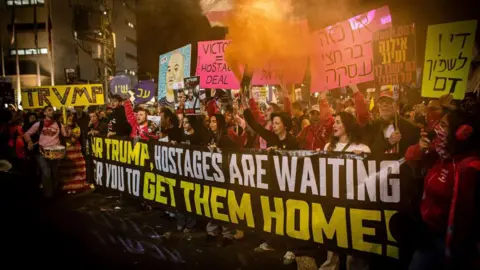 Getty Images
Getty ImagesThis week, Netanyahu faces a major challenge to balance pressures from the US – Israel’s closest ally – and domestic ones within his own coalition.
While the idea favoured by Saudi Arabia of creating a Palestinian state alongside Israel – the so-called “two-state solution” – has long been the international formula for Middle East peace, the Israeli PM and members of his government have become even more strongly opposed to the idea since the 7 October attacks. They argue this would result in a “terror state”.
The existing ceasefire deal has also been dismissed as “reckless” by Israeli hardliners, such as Finance Minister Bezalel Smotrich who say it has endangered Israel’s security by ending fighting before Hamas was fully defeated in line with war goals.
With wide Israeli public support for continuing the ceasefire to free more hostages, other politicians have offered a potential lifeline to Netanyahu.
Visiting Nir Oz, a kibbutz near Gaza among those worst hit by the Hamas-led attacks, opposition leader Yair Lapid said of the talks with Trump: “It’s important to make crystal clear before that meeting: Netanyahu has a political safety net from the opposition for the deal, for every stage. There is no political reason preventing Netanyahu from going to the next phase.”

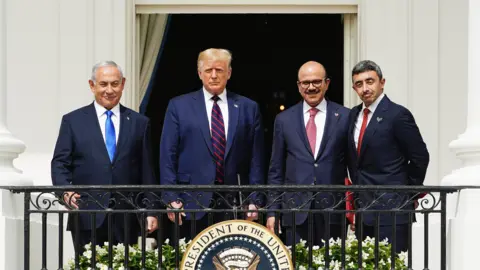 EPA
EPAIn his previous term, the US president gave a series of wins to Netanyahu.
As well as securing the signing the Abraham Accords, he notably relocated the US embassy to Jerusalem, a move which was condemned by the Palestinians and others, and recognised Israeli sovereignty over the occupied Golan Heights, which is otherwise seen internationally as Syrian territory.
The new Trump administration includes pro-Israel figures expected to push back against pressure from other world powers over the Gaza war and endorse expansion of Israeli settlements in the occupied West Bank. They are considered to be illegal under international law, although Israel disagrees.
Already there have been marked changes from US policy under Biden. Trump has lifted sanctions on Israeli settlers accused of violence against Palestinians and reportedly approved a shipment of 2,000lb bombs that had previously been blocked.
However, Trump and Netanyahu have had an up-and-down personal relationship and there is extensive speculation in the Israeli media about how the upcoming meeting between the pair will unfold.
Commenting in Israel’s Yedioth Ahronoth newspaper, Nahum Barnea writes that “Netanyahu will try to sniff out the new Trump and to get a sense of what animates him, what turns him off and what infuriates him.”
The prominent Israeli journalist – using strong language – goes on to warn Netanyahu that as he does so: “He would do well to bear in mind the old American adage: ‘Don’t bullshit a bullshitter.’ Trump is at the pinnacle of his life, at peak strength and at his most euphoric. His ambition is huge, his gratification immediate and his patience thin. You’ve been duly warned.”
Article by:Source:


